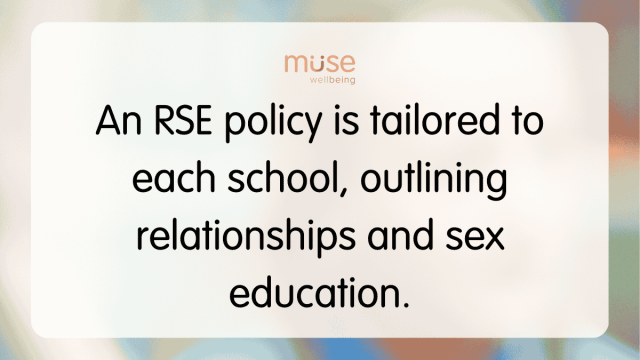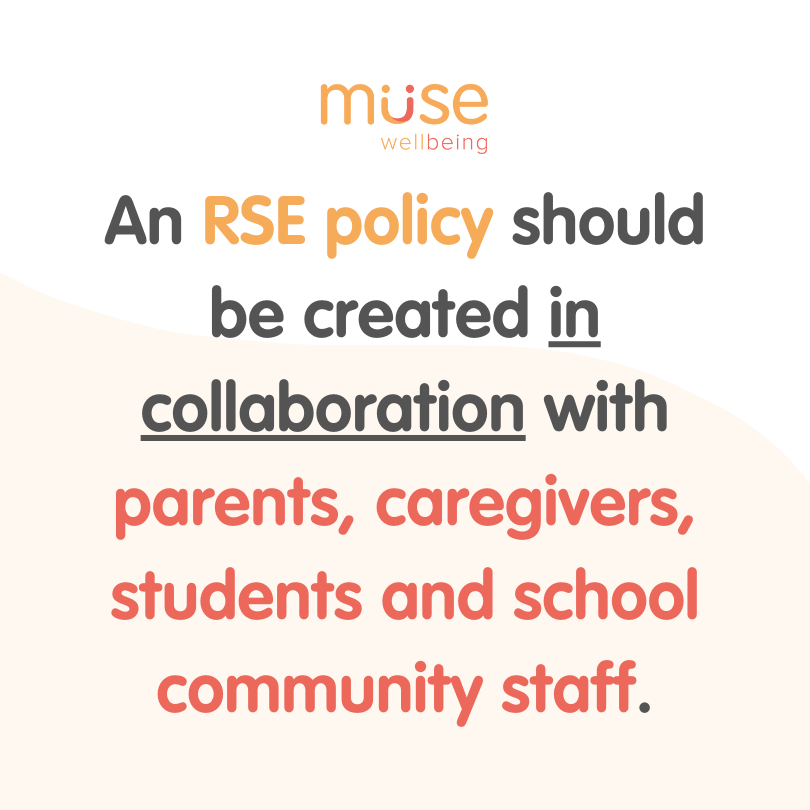Developing a Primary RSE Policy

David is the Muse Wellbeing director and lead curriculum developer. His Main passions include education, surfing and travelling.

Eloise is a UK based primary educator and freelance writer. Passionate about education, she enjoys crafting engaging learning content
Developing a Primary RSE Policy
An RSE policy is an essential document for any primary school, freely available to all school community members. A primary RSE policy should outline the mandatory relationships education and any additional sex education topics that schools choose to teach, offering a transparent scheme of learning for all.
RSE was introduced in primary schools in 2020 as part of the statutory curriculum in England. It provides age-appropriate education on relationships, sex and personal safety, helping students understand their emotions, relationships and bodies. RSE is part of the broader PSHE curriculum, supporting the development of well-rounded individuals. You can learn more about the RSE curriculum here.
A well-structured RSE scheme of work, like Muse Wellbeing, simplifies policy development by offering fully resourced lessons for schools.
What Is An RSE Policy?
An RSE policy is unique to each school, shaped by consultation with parents and caregivers, and reflecting the needs of both the pupils and their community. While it is individual to each school, the policy must adhere to the same guidelines, outlining the school’s approach to delivering RSE.

The policy defines relationships and sex education topics, clarifying what will be taught and how. It should be accessible to staff, parents, and stakeholders, and may be requested by Ofsted inspectors.
Developing A Primary RSE Policy
An effective RSE policy should clearly communicate what will be taught and how. It should include timetables, lesson plans, learning outcomes, and who is responsible for teaching.
Given that RSE is mandatory, a clear policy is vital, especially with questions often arising from parents, caregivers and all involved within the school
A primary RSE policy should:
- Define relationships education and any sex education taught (even though sex education isn’t mandatory at primary level).
- Provide a clear guide to subject content, how it’s taught, and who teaches it.
- Detail how lessons are monitored and evaluated.
- Explain the right to withdraw from sex education, and clarify that no one can opt-out of mandatory relationships and health education.
- Specify when the policy will be reviewed.
The policy should be made available to anyone that requests it and it’s usually a good idea to publish it on the school website.
Typically, the policy includes sections on:
- The scheme of work and how topics are taught at different ages.
- The responsibilities of staff involved in delivering RSE.
- How the policy was created and will be reviewed (with parental input).
- How content will be accessible to every student, especially SEND pupils.
- Legal requirements for schools.
- A well-designed policy reflects the views of parents, caregivers, pupils and teachers, ensuring it meets the community’s needs.
A well-designed policy reflects the views of parents, pupils, and teachers, ensuring it meets the community’s needs.
Using An RSE Programme to Develop An RSE Policy
An RSE programme like Muse Wellbeing can streamline policy development. With a Muse subscription, teachers get access to 216 age-appropriate lessons, yearly overviews, lesson plans, and resources tailored to diverse learners. These materials can easily be included in an RSE policy. Muse’s comprehensive resources make it simpler for schools to adopt a clear, consistent RSE programme.
To maintain transparency, schools should make all RSE materials available to parents. When creating a policy, use examples from the Muse programme during consultations so parents fully understand the content and approach.
How Often Should An RSE Policy Be Reviewed?
Though there is no strict guidance, an RSE policy should ideally be reviewed annually. This ensures it stays current with updated resources, curriculum changes, and the evolving needs of pupils.
Working With Parents to Develop An RSE Policy
Consulting parents is crucial when creating or reviewing an RSE policy. Schools must collaborate with parents, who play an important role in teaching children about relationships. Even though parents cannot withdraw children from relationships or health education, providing them with access to resources and engaging them in the consultation process helps address any concerns.

These consultations offer parents clarity on what will be taught and how to discuss these topics at home, strengthening the partnership between school and parents.
A Ready Made RSE Policy and Curriculum
An RSE policy should be readily available to anyone who requests it. It’s vital for safeguarding and the wellbeing of students, and Ofsted inspectors increasingly focus on it.
RSE prepares children for modern life, and the Muse Wellbeing curriculum goes above and beyond the DfE guidelines to give schools access to a comprehensive PSHE and RSE curriculum.
By using a programme like Muse Wellbeing, developing a primary RSE policy becomes more manageable. All the necessary lesson plans, overviews, and resources are available with a subscription, making it easy to implement a robust, age-appropriate RSE curriculum.
Muse Wellbeing
Subscribe for RSHE & Wellbeing Updates & Learning Resources

Copyright © 2026 Muse | All Rights Reserved.
Would you like to logout of Muse Wellbeing?


